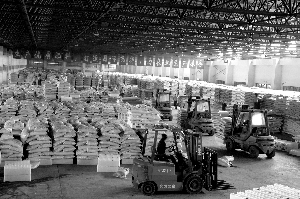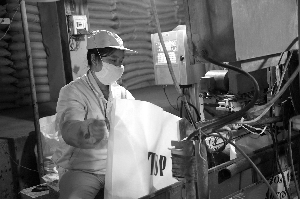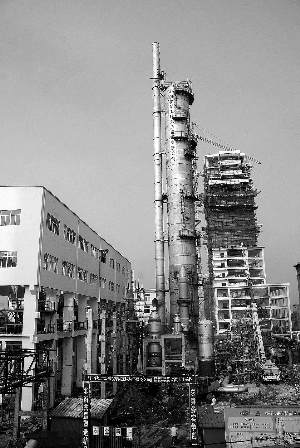In the first three quarters of this year, the total export value of various Phosphate Fertilizer products of Qifu Group was US$716 million, a year-on-year increase of 80.99%. The picture shows that the group's phosphate fertilizers are being pulled out of storage. (Photographed by special reporter Wu Guangbing) At present, many phosphate fertilizer companies are stepping up production of small-scale fertilizers to supply the international market. The picture shows the women's workers of Guizhou Kaisuo Group's production workshop are packing heavy calcium products for export. (Contribution reporter Luo Wei photo) Anhui Huaihua Group strives to improve the technical level of the company. The picture shows that the 200,000 tons/year *** technology reform project initiated by the group this year is under construction. (Specialist reporter Cao Hui photo) Cleaning Scraper,Plaque Scraper,Tooth Scraper,Tongue Cleaner Brush JIANGSU RARHON TOOLS CO.,LTD , https://www.rarhontools.com
Sinochem New Network News In recent days, the rumors of the tightening of export policies for small-scale fertilisers in the countries concerned have been disturbing in the fertilizer industry. The earliest winds came from the 16th National Fertilizer Market Seminar held in mid-September. National Development and Reform Commission officials disclosed that in order to ensure the spring and fourth quarter of this year and the next spring to plough agricultural production and stabilise the domestic chemical fertilizer market supply and prices, the country will introduce a The export control of small-scale fertilizers such as calcium (heavy superphosphate), super-calcium (superphosphate), and nitrogen-phosphorus binary compound fertilizers does not rule out the possibility of introducing new policies at any time in the fourth quarter of this year. On November 1, the National Development and Reform Commission official website published in the article “China's Fertilizer Export Situation in the First Three Quarters of the Year†mentioned that at present, we are paying close attention to the export situation of small-scale chemical fertilizers, studying related policies and measures, and ensuring spring agriculture in the fourth quarter of this year and even next year. Production, stabilizing fertilizer market supply and prices.
The trend of this policy immediately attracted the attention of chemical fertilizer companies. The industry suddenly talked about one after another.
Small varieties drilled "Da Kong Zi"
Wu Xiyan, chairman of the China Phosphate Fertilizer Industry Association, confirmed this rumor in an interview with reporters. He told the CCIN reporter that recently he had received a draft of the government’s consultation paper on adjusting the export policy for heavy calcium, calcium sulphate, and nitrogen-phosphorus binary compound fertilizer. As for why the export thresholds of urea, monoammonium phosphate, diammonium phosphate, and ternary compound fertilizers were raised earlier this year, the export tariffs on small-scale fertilizers should continue to be raised. The reason given by the relevant authorities is that although it has been closed since the beginning of the year, Tightening the export of nitrogen fertilizers and phosphate fertilizers, but the export of small-scale chemical fertilizers, which have not been regulated or export tariffs are relatively low, has significantly increased, which has exposed loopholes in the export tariff policy for fertilizers.
In the first three quarters, the country’s fertilizer exports grew rapidly. According to the data released by the National Development and Reform Commission recently, the total domestic chemical fertilizer exports were 12.24 million tons in the first three quarters, a year-on-year increase of 18.4%. Among them, 2.11 million tons were exported in September, up 2.7% year-on-year. The export structure has different characteristics due to different tariffs. At present, the export of high-tariff urea, ternary compound fertilizer, diammonium phosphate, and monoammonium phosphate has dropped more or remained flat compared with the same period of last year, and the export growth rate is mainly nitrogen and phosphorus binary fertilizer, ammonium sulfate, heavy calcium, and general calcium. Low-tariff or zero-tariff small varieties such as ammonium chloride. Small-scale fertilizers have become the absolute leading species in the fertilizer export market this year.
It is understood that this year's small-scale fertilizer export performance is so eye-catching, mainly because the country's adjustment of urea, diammonium phosphate and other high-concentration fertilizers after the tariff policy, urea, diammonium phosphate and other products are seriously blocked exports. In the face of strong international demand, many manufacturers are unable to walk along the path and use small chemical fertiliser space where the policy has not been limited, and have changed their production of low-concentration heavy calcium, super-calcium, and nitrogen-phosphorus binary compound fertilizers to Southeast Asia. And the Middle East.
However, Wu Xiyan believes that although the exports of small-scale fertilizers such as heavy calcium, super-calcium, and nitrogen-phosphorous binary compound fertilizers have increased substantially this year, the total export volume is still very small. For example, the export volume of heavy calcium in the first three quarters only accounted for about 5% of the domestic production of phosphate fertilizers. The proportion of primary calcium exports is even smaller, which is not enough to affect domestic agricultural fertilizers. On the other hand, these varieties are not the best-selling varieties in the domestic market, and they are not widely recognized by domestic farmers. In recent years, sales have been very small. Heavy calcium and super-calcium have more than 2 million tons of production capacity in China, but they can only sell tens of thousands of tons each year. Nitrogen and phosphorus binary compound fertilizers are produced using ammonium chloride. Since chlorine-containing ions cannot be used in the northern drylands in China, sales are very low. The ammonium chloride is a soda-alkaline co-product, that is, when using the soda process to produce 1 ton of soda ash, it must produce 1 ton of ammonium chloride. Every year there are 10 million tons of ammonium chloride production capacity in the country. If the ammonium chloride does not go out, it will stop the development of the domestic soda industry. 
Enterprises want to stay "small" road Wu Xixi still that point of view, and let these small varieties of production companies in the domestic fight, die, it is better to put their exports to a living. For this reason, the China Phosphate Fertilizer Industry Association is prepared to reflect this opinion to the relevant state agencies and strive for some more modest export policies. Because once the policy is introduced, the impact on the industry is certainly not optimistic. In the long run, it is equal to harming the strength of domestic fertilizer manufacturers.
The same is true for some companies.
Zhao Siyi, chairman and president of Sichuan New Century Group, believes that tightening export tariffs on small-scale chemical fertilizers will not be conducive to the development of the industry. Now the entire industry has been in a difficult period. The new tariff policy will again restrict exports, increase domestic competition, and bring greater difficulties to the industry. The new tariff policy affects exports on the one hand, and it also causes chaos in the domestic market on the other. Now whether it is urea or nitrogen-phosphorus binary fertilizer production enterprises, because of the high cost of raw materials and manpower, if you do not rely on exports, the country will accumulate more inventory, so prices will certainly fall, but the magnitude of the decline is still uncertain. Now that the distributors are afraid of falling prices and are afraid to get the goods, the pressure on compound fertilizer companies will be even greater.
Shen Weihua, chairman of Shanghai COOEC Agricultural Production Co., Ltd., said that the country’s export policy has been tight and has kept companies from feeling at a loss. In particular, due to financial pressure and the unstable financial environment this year, many companies are facing financial difficulties and the funding chain of SMEs is even more fragile. Once the export policy is "slammed", it will have a great impact on the company's capital chain and business layout. Many manufacturers cannot adjust short-term, which may lead to business crisis and even closure of the company.
However, Wu Xiyan also frankly stated that in order to fully protect the supply of domestic chemical fertilizers and curb excessive price increases, the central government has great determination in implementing strict policies for the export of chemical fertilizers. These small varieties will be included in high tariffs or higher tariff management. “It is estimated that the policy of small-scale fertilizer tariff adjustment in December will be introduced.â€
The reporter learned that the current psychological impact of tariff rumors, the recent decline in the price of ammonium chloride and monoammonium phosphate, compound fertilizer manufacturers wait and see mood began to increase. In addition, due to the end of the domestic autumn market, the introduction of the new export policy will have little impact on the market in autumn, but considering that after October, the two export windows of urea and diammonium are closed, and the third of the small-scale fertilizers will be considered. With the window closed, the market situation in the spring may not be optimistic.
Do not expect to save the surplus but there are currently two weaknesses that anyone can avoid. China's soft underbelly is high energy consumption, and the soft underbelly of the fertilizer industry is excess capacity. And these two soft ribs are the hard truth for the state to limit the export of chemical fertilizers.
Han Jian, a nitrogen fertilizer analyst at Zhuo Chuang, pointed out that the rapid growth of heavy chemical industries including chemical fertilizers has stimulated a rapid growth in China’s energy consumption. If China’s energy consumption maintains an average growth rate of 8.9% since the beginning of this century, China’s energy consumption will reach 8 billion tons of standard coal in 2020, which accounts for more than half of the world’s total energy consumption. This is China’s resource and environment cannot carry of.
According to monitoring data, China's nitrogen fertilizer and phosphate fertilizer production capacity has been in excess since 2006. In 2010, China’s new nitrogen fertilizer production capacity was 4.1 million tons, and it reached 66 million tons by the end of the year, while domestic consumption was only around 50 million tons. The production capacity of phosphate fertilizers has reached 20 million tons, and the average domestic consumption in the past two years is 11 million. 11.5 million tons. Among them, China's DAP production capacity exceeds 15 million tons, while last year's domestic consumption was only about 750 million tons; Pu calcium production capacity of more than 2 million tons, while the domestic average consumption of less than 1 million tons. Since the second half of this year, factors such as energy saving and emission reduction and shutting down of production capacity have caused the price of fertilizers to rise. It seems that the industry has forgotten the problems caused by excess production capacity, and many idle production capacity has been reopened to full production. It is an indisputable fact that excess capacity has caused the industry to fall into trouble. Adjustment of export tariffs is only a fuse. If this problem is not truly resolved, even if export tariffs do not adjust, industry losses will still be difficult to avoid. At the same time, it is also a great waste of resources.
Han Hongmei, deputy director of the Fertilizer Division of the Petroleum and Chemical Industry Planning Institute, said that the reason why the country has to restrict exports of small-scale fertilizers is based on the country’s attitude towards the entire fertilizer industry. The state's general policy for chemical fertilizers is to stabilize supply and demand and restrict exports. This is similar to the policy on food, based on the principle of self-sufficiency, and neither wants foreign fertilizers to hit the domestic market nor does it want domestic fertilizer exports. Therefore, small-scale fertilizer production enterprises such as heavy calcium, calcium and calcium, etc., in order to get rid of difficulties, hope that exports will not work, must be based on domestic development, this is the fundamental solution to the problem.
According to Long Wenjun, who is responsible for the early-warning monitoring and analysis task group of the Ministry of Agriculture and an associate researcher of the Rural Economic Research Center, the reason why the country considers introducing a more stringent tariff policy is to control the export of resources on the one hand and to stabilize the other on the other. Prices stabilize the prices of agricultural products by stabilizing the prices of domestic fertilizers.
Long Wenjun further analyzed that in recent years, the country’s export restrictions on high energy consumption, high pollution, and resource products have become increasingly stringent, while export fertilizers are equivalent to indirectly exporting domestic coal, phosphate rock, and energy, and the export of chemical fertilizers. Naturally, it will not be encouraged by policies. In addition, large exports of fertilizers will also lead to deterioration of domestic inflation. Since the beginning of this year, the export of small-scale chemical fertilizers such as heavy calcium, calcium sulphate, and nitrogen-phosphorus binary compound fertilizer has soared, which has greatly stimulated the prices of these chemical fertilizer varieties, promoted price increases, and drove the rapid rise in the prices of raw materials. From the current data, the current exports of nitrogen and phosphorus binary compound fertilizers have been several times that of last year's total exports, and prices have therefore remained high. In terms of the export volume of Jiangsu Province, many enterprises have been busy exporting nitrogen and phosphorus binary compound fertilizer since April, resulting in tight supply in Jiangsu Province and rising prices. At the same time, the export of fertilizers drove up the prices of raw materials such as ammonium sulfate and ammonium chloride, and their prices have now deviated from the rational track. For example, the price of ammonium chloride rose from the previous 500 yuan/ton to the current 1,200 yuan/ton, and the price far exceeds its actual value.
“Now the prices of agricultural and sideline products have been rising. Fertilizer input is a major factor in driving up prices. After the tightening of export policies, fertilizer prices are bound to have a pullback, which will reduce farmers’ input costs and positively stabilize the prices of agricultural and sideline products. Therefore, I think that it is always a good thing to raise the export tariffs on small-scale fertilizers,†said Long Wenjun. 